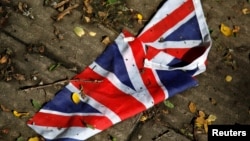Cambodian-born Jeremy Chea was transfixed by television reports of results from the United Kingdom's referendum on leaving the European Union.
Chea, who lived in the U.K. for 29 years, said he regretted the so-called Brexit outcome, in which the country voted by a slim margin to leave the European bloc. His former home hadn't faced any major economic or security issues for some time, he said, but it would have a hard time in the future, as the EU might seek to punish it for leaving.
"Now the EU is getting angry with England because its citizens will walk away," he lamented. "The important thing [is that the EU] will make it [expensive] for England to leave the EU. Why do they want Britain to get bad deals? It's because they don't want other countries to follow England?"
Bilateral trade between Cambodia and Britain rose from over $930 million in 2014 to about $1 billion in 2015, an increase of 23 percent, according to the British Embassy.
Chum Sounry, spokesman for the Ministry of Foreign Affairs, said there would be no impact on Cambodia-U.K. relations.
"This stage is the time that we have to keep track of how the situation develops," he said. "It's not the time for us now to do a clear evaluation."
Treaties seen as key
Chea, a former British police officer, said the new prime minister slated to replace David Cameron, who recently announced his resignation, will inevitably have a hard task ahead.
"The important thing is that for the next two to three years, Britain will work to handle treaties such as a bilateral treaty with the United States, France and Spain," he said. "For example, if Britain worked well on this, that would be positive. Britain would be more prosperous if it could obtain good agreements.
"But I think that the agreements would not be as good as before," he added. "This issue is the most important issue for the next two or three years. The important thing is that there must be a strong person who could fight for a better agreement."
Disappointment predicted
Principal factors believed to have driven almost 52 percent of voters to back leaving: the perceived impact of mass immigration; the apparent economic cost of being a part of the union; the perception that the country had sold off its sovereignty to Brussels.
Chap Sotharith, a senior economic researcher at the Cambodian Institute for Cooperation and Peace (CICP), told VOA that British people will come to regret their decision, because companies will leave in favor of other financial centers, such as Dublin and Frankfurt.
Stock prices plummeted rapidly after last week's announcement, and already there are signs that EU leaders have lost confidence in Britain, he said.
The U.K. joined the EU's predecessor, the European Economic Community, in 1973 as the proverbial "sick man of Europe." It had since rebounded to become the second-largest economy on the continent after Germany. But since the Brexit result, it has already slipped into third place behind France.
Sotharith said companies that exported from Cambodia to the U.K. would be affected.
"If the U.K. imposes tax on our products, we would feel the effect if we have to trade with each other," he said. "We will need to negotiate a new trade deal between the countries."
This report was produced in collaboration with VOA's Khmer service.
